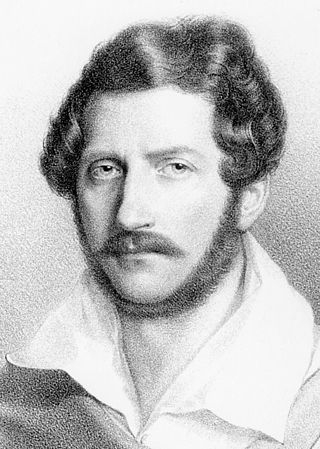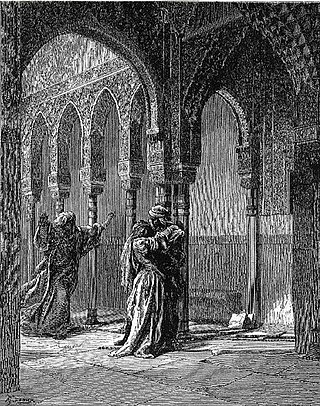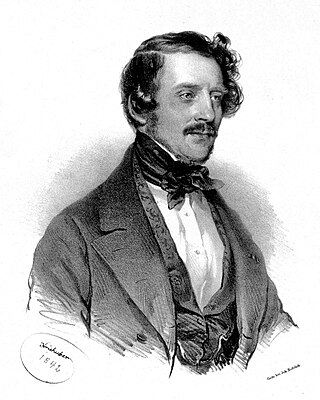
Il campanello or Il campanello di notte is a dramma giocoso, or opera, in one act by Gaetano Donizetti. The composer wrote the Italian libretto after Mathieu-Barthélemy Troin Brunswick and Victor Lhérie's French vaudeville La sonnette de nuit. The premiere took place on 1 June 1836 at the Teatro Nuovo in Naples and was "revived every year over the next decade".

Caterina Cornaro ossia La Regina di Cipro is a tragedia lirica, or opera, in a prologue and two acts by Gaetano Donizetti. Giacomo Sacchero wrote the Italian libretto after Jules-Henri Vernoy de Saint-Georges' libretto for Halévy's La reine de Chypre (1841). It is based on the life of Caterina Cornaro, Queen of Cyprus from 1474 to 1489. It premiered at the Teatro San Carlo, Naples on 12 January 1844.

Emilia di Liverpool is a dramma semiserio, ("half-serious") dramatic opera, in two acts with music by Gaetano Donizetti. Giuseppe Checcherini wrote the Italian libretto after the anonymous libretto for Vittorio Trento's Emilia di Laverpaut, itself based on Stefano Scatizzi's play of the same name. It premiered on 28 July 1824 at the Teatro Nuovo in Naples.

Il diluvio universale is an azione tragico-sacra, or opera, by Gaetano Donizetti. The Italian libretto was written by Domenico Gilardoni after Lord Byron's Heaven and Earth and Francesco Ringhieri's tragedy Il diluvio (1788).

Pia de' Tolomei is a tragedia lirica in two acts by Gaetano Donizetti. Salvadore Cammarano wrote the Italian libretto after Bartolomeo Sestini's verse novella Pia de' Tolomei, which was based on Canto V, vv. 130–136 from Dante's narrative poem The Divine Comedy part 2: Purgatorio. It premiered on 18 February 1837 at the Teatro Apollo in Venice.

Zoraida di Granata is a melodramma eroico, in two acts by Gaetano Donizetti. The Italian libretto had been partly prepared by Bartolomeo Merelli, based on the French play, Gonzalve de Cordoue ou Grenade Reconquise by Jean-Pierre Claris de Florian (1791), and on a libretto by Luigi Romanelli to an opera by Nicolini called Abenamet e Zoraide.

Marino Faliero is a tragedia lirica, or tragic opera, in three acts by Gaetano Donizetti. Giovanni Emanuele Bidera wrote the Italian libretto, with revisions by Agostino Ruffini, after Casimir Delavigne's play. It is inspired by Lord Byron's drama Marino Faliero (1820) and based on the life of Marino Faliero (c.1285-1355), the Venetian Doge.

Maria Padilla is a melodramma, or opera, in three acts by Gaetano Donizetti. Gaetano Rossi and the composer wrote the Italian libretto after François Ancelot's play. It premiered on 26 December 1841 at La Scala, Milan. The plot is loosely based on the historical figure María de Padilla, the mistress of Pedro the Cruel, King of Castile.

Torquato Tasso is a melodramma semiserio, or "semi-serious" opera, in three acts by Gaetano Donizetti and based on the life of the great poet Torquato Tasso. The Italian libretto was written by Jacopo Ferretti, who used a number of sources for his text, including works by Giovanni Rosini, Goethe, Goldoni and Lord Byron, as well as Tasso's actual poetry. It premiered on 9 September 1833 at the Teatro Valle, Rome.

Deux Hommes et une femme, also known as Rita, is an opéra comique in one act, composed by Gaetano Donizetti to a French libretto by Gustave Vaëz. The opera, a domestic comedy consisting of eight musical numbers connected by spoken dialogue, was completed in 1841. Never performed in Donizetti's lifetime, it premiered posthumously at the Opéra-Comique in Paris on 7 May 1860.

Gabriella di Vergy is an opera seria in two acts by Gaetano Donizetti written in 1826 and revised in 1838, from a libretto by Andrea Leone Tottola, which was based on the tragedy Gabrielle de Vergy (1777) by Dormont De Belloy. Prior to that, the play was itself inspired by two French medieval legends, Le châtelain de Coucy et la dame de Fayel and Le Roman de la chastelaine de Vergy.

Gemma di Vergy is an 1834 tragedia lirica in two acts by Gaetano Donizetti from a libretto by Giovanni Emanuele Bidera. It is based on the tragedy Charles VII chez ses grands vassaux(Charles VII and His Chief Vassals) (1831) by Alexandre Dumas père, which was later to become the subject of the opera The Saracen by the Russian composer César Cui.

Imelda de' Lambertazzi is a melodramma tragico or tragic opera in two acts by Gaetano Donizetti from a libretto by Andrea Leone Tottola, based on the tragedy Imelda by Gabriele Sperduti. It received its first performance on 5 September 1830 at the Teatro San Carlo, Naples.

Gianni di Calais is a melodramma semiserio, a "semi-serious" opera in three acts by Gaetano Donizetti (1828), from a libretto by Domenico Gilardoni, based on Jean de Paris by Louis-Charles Caigniez.

Gianni di Parigi is an 1839 melodramma comico in two acts with music by Gaetano Donizetti to a libretto by Felice Romani, which had previously been set by Francesco Morlacchi in 1818 and by Giovanni Antonio Speranza in 1836.

La zingara is an opera semiseria in two acts by Gaetano Donizetti, set to a libretto by Andrea Leone Tottola after La petite bohémienne by Louis-Charles Caigniez, which was itself derived from a work of August von Kotzebue.

Alfredo il grande is a melodramma serio or serious opera in two acts by Gaetano Donizetti. Andrea Leone Tottola wrote the Italian libretto, which may have been derived from Johann Simon Mayr's 1818 opera of the same name. The opera tells the story of the Anglo-Saxon king Alfred the Great.

Adelia, o La figlia dell'arciere is an opera in three acts by Gaetano Donizetti. The Italian libretto was written partly by Felice Romani and by Girolamo Maria Marini, a part-time poet who had achieved notability the previous year with Otto Nicolai's Il templario. The opera premiered at the Teatro Apollo, Rome on 11 February 1841.

Don Gregorio is an 1826 opera by Gaetano Donizetti from a libretto by Jacopo Ferretti and adapted from his popular 1824 opera buffa L'ajo nell'imbarazzo, which had enjoyed considerable success when presented at the Teatro Valle in Rome on 4 February 1824.

Una follia is a farsa in one act by composer Gaetano Donizetti. The work premiered on 15 December 1818 at the Teatro San Luca in Venice. The opera uses the same Italian-language libretto by Bartolomeo Merelli after August von Kotzebue's Der Graf von Burgund that Donizetti used for his Enrico di Borgogna a month earlier, but with different music. It was given one performance and "never performed again, and its score has never been found."







